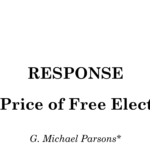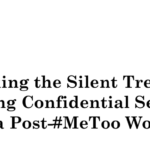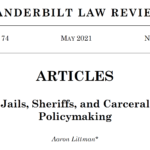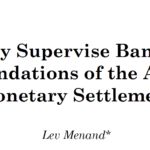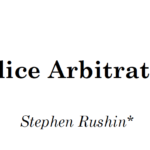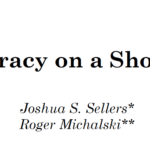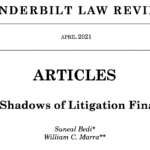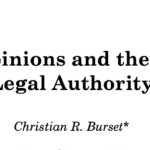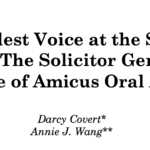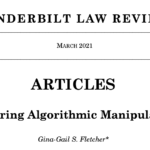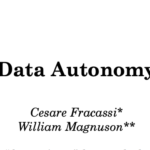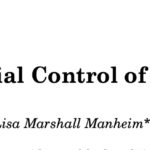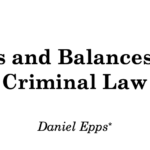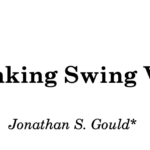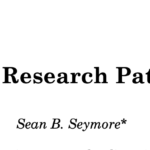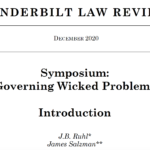Articles Category
The Price of Free Elections
Aug. 26, 2021—G. Michael Parsons | 74 Vand. L. Rev. En Banc 335 (2021) | How much does an election cost? For a democracy as old as ours, the answer is surprisingly unclear . . . . Among the many contributions of Democracy on a Shoestring, then, is to spur more concrete thinking about the costs and...
Rethinking the Silent Treatment
Aug. 22, 2021—Sasha Gombar | 74 Vand. L. Rev. En Banc 289 (2021) | When the hashtag “MeToo” was popularized in the wake of the Harvey Weinstein scandal, the underlying philosophy was simple. Too many people had claimed that women’s stories about sexual assault lacked corroboration, dismissing evidence of workplace sexism as merely “anecdotal.” However, when enough women started telling...
Jails, Sheriffs, and Carceral Policymaking
May. 28, 2021—Aaron Littman | 74 Vand. L. Rev. 861 (2021) | The machinery of mass incarceration in America is huge, intricate, and destructive. To understand it and to tame it, scholars and activists look for its levers of power—where are they, who holds them, and what motivates them? This much we know: legislators criminalize, police arrest,...
Why Supervise Banks? The Foundations of the American Monetary Settlement
May. 28, 2021—Lev Menand | 74 Vand. L. Rev. 951 (2021) | Administrative agencies are generally designed to operate at arm’s length, making rules and adjudicating cases. But the banking agencies are different: they are designed to supervise. They work cooperatively with banks and their remedial powers are so extensive they rarely use them. Oversight proceeds through...
Police Arbitration
May. 28, 2021—Stephen Rushin | 74 Vand. L. Rev. 1023 (2021) | Before punishing an officer for professional misconduct, police departments often provide the officer with an opportunity to file an appeal. In many police departments, this appeals process culminates in a hearing before an arbitrator. While numerous media reports have suggested that arbitrators regularly overturn or...
Democracy on a Shoestring
May. 28, 2021—Joshua S. Sellers & Roger Michalski | 74 Vand. L. Rev. 1079 (2021) | Democracy requires money. Voters must be registered, voting rolls updated, election dates advertised, voting technology purchased and tested, poll workers trained, ballots designed, votes counted and verified, and on and on. Despite the importance of election expenditures, we have a shamefully...
The Shadows of Litigation Finance
Apr. 20, 2021—Suneal Bedi & William C. Marra | 74 Vand. L. Rev. 563 (2021) | Litigation finance is quickly becoming a centerpiece of our legal system. Once a dispute arises, litigants may seek money from third-party financiers to pay their legal bills or monetize their claims, and in turn those financiers receive a portion of any...
Advisory Opinions and the Problem of Legal Authority
Apr. 20, 2021—Christian R. Burset | 74 Vand. L. Rev. 621 (2021) | The prohibition against advisory opinions is fundamental to our understanding of federal judicial power, but we have misunderstood its origins. Discussions of the doctrine begin not with a constitutional text or even a court case, but a letter in which the Jay Court rejected...
The Loudest Voice at the Supreme Court: The Solicitor General’s Dominance of Amicus Oral Argument
Apr. 20, 2021—Darcy Covert & Annie J. Wang | 74 Vand. L. Rev. 681 (2021) | The Solicitor General (“SG”) is often called the “Tenth Justice,” a title that captures his unique relationship with the Supreme Court and his independence from the executive branch. No phenomenon better reflects this relationship than the Court’s practice of permitting amici...
Deterring Algorithmic Manipulation
Mar. 24, 2021—Gina-Gail S. Fletcher | 74 Vand. L. Rev. 259 (2021) | Does the existing anti-manipulation framework effectively deter algorithmic manipulation? With the dual increase of algorithmic trading and the occurrence of “mini-flash crashes” in the market linked to manipulation, this question has become more pressing in recent years. In the past thirty years, the financial...
Data Autonomy
Mar. 24, 2021—Cesare Fracassi & William Magnuson | 74 Vand. L. Rev. 327 (2021) | In recent years, “data privacy” has vaulted to the forefront of public attention. Scholars, policymakers, and the media have, nearly in unison, decried the lack of data privacy in the modern world. In response, they have put forth various proposals to remedy...
Presidential Control of Elections
Mar. 24, 2021—Lisa Marshall Manheim | 74 Vand. L. Rev. 385 (2021) | In recent decades, presidents of both political parties have asserted increasingly aggressive forms of influence over the administrative state. During this same period, Congress has expanded the role that the federal government plays in election administration. The convergence of these two trends leads to...
Checks and Balances in the Criminal Law
Jan. 26, 2021—Daniel Epps | 74 Vand. L. Rev. 1 (2021) | The separation of powers is considered essential in the criminal law, where liberty and even life are at stake. Yet the reasons for separating criminal powers are surprisingly opaque, and the “separation of powers” is often used to refer to distinct, and sometimes contradictory, concepts....
Rethinking Swing Voters
Jan. 26, 2021—Jonathan S. Gould | 74 Vand. L. Rev. 85 (2021) | In recent decades, swing voters in courts and legislatures have made many of the United States’ most important decisions of law and policy. It would be easy to conclude from the recent history of the Supreme Court and Congress that democracy or majority rule...
The Research Patent
Jan. 26, 2021—Sean B. Seymore | 74 Vand. L. Rev. 143 (2021) | The patent system gives courts the discretion to tailor patentability standards flexibly across technologies to provide optimal incentives for innovation. For chemical inventions, the courts deem them unpatentable if the chemical lacks a practical, non-research-based use at the time patent protection is sought. The...
Symposium: Governing Wicked Problems, Introduction
Dec. 22, 2020—J.B. Ruhl & James Salzman | 73 Vand. L. Rev. 1561 (2020) | The purpose of this Article is . . . to provide in legal scholarship a concise summary of wicked problems theory from its roots in Rittel and Webber’s article through its evolution in policy science and planning scholarship. Not coincidentally, this sets...
